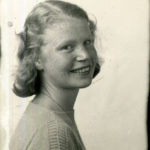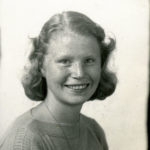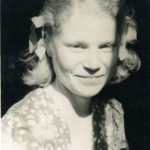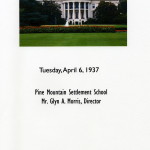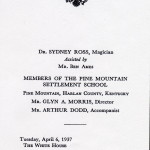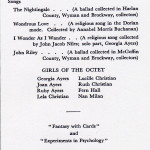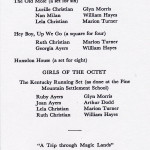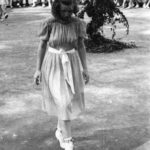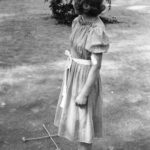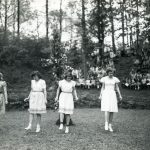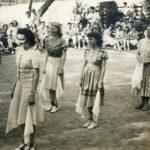Pine Mountain Settlement School
Series 19: STUDENTS
Lucille Christian, Student 1935-1940
Lucille Christian McKinney (1921-2017)
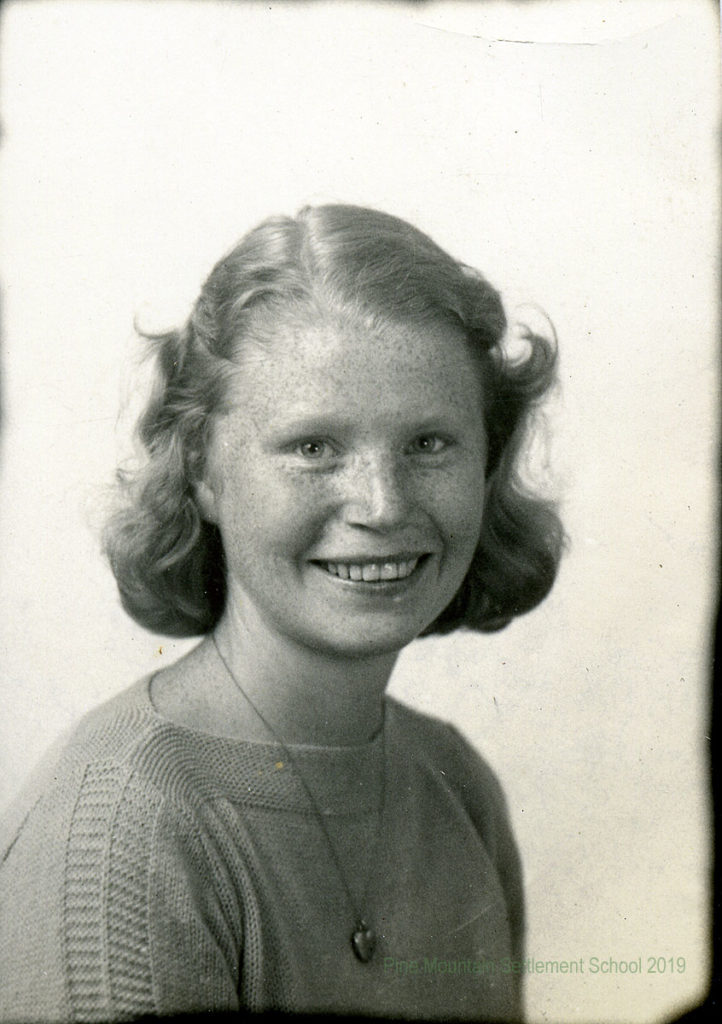
70 Lucille Christian, portrait. [burk_people_070.jpg]
TAGS: Lucille Christian McKinney, Lela Christian Meador, Ruth Christian Russell, Pine Mountain Settlement School Girl’s Octet, George McKinney II, Berea College, Grace Nettleton Home, Glyn Morris, Richmond VA, desegregation, race relations, Everett K. Wilson, English Country Dance, Brown v. Board of Education
LUCILLE CHRISTIAN Student
Boarding School Student, 1935-1940 (1939 Graduate)
Member, PMSS Octet, 1936-1937
Lucille Christian McKinney, the last surviving member of the Pine Mountain Settlement School Girl’s Octet died on August 14, 2017, in Cary, Wake County, North Carolina.
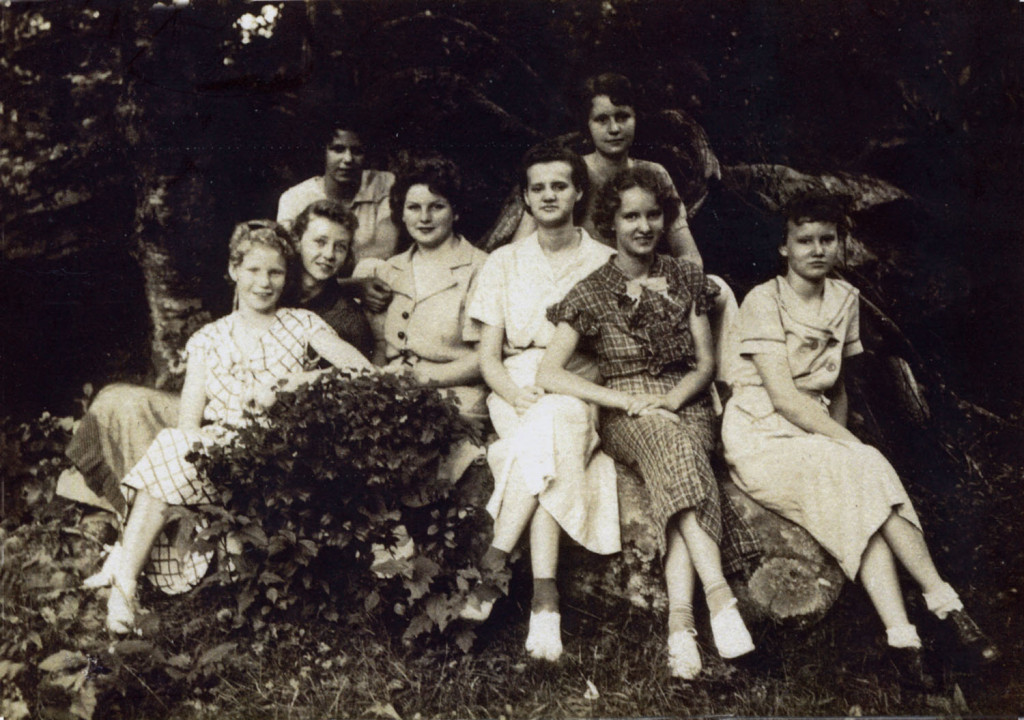
PMSS Octet members, 1937. (l-r) Lucille Christian ; Fern Hall ; Lela Christian ; Nan Milan ; Georgia Ayers ; Ruth Christian ; Joan Ayers ; Ruby Ayers [octet_01a001_mod.jpg]
From anecdotal notes of Glyn Morris, Director of Pine Mountain Settlement School ,1931-1941:
“When the Student Interviewers called at the big rambling smoky coal camp hotel to interview Lucille’s sister [Ruth?], who was applying for admission to Pine Mountain in 1933, Lucille appeared in the back hall, too timid to come out in the open with her rumpled towhead and bare feet.
Her father, a deputy sheriff, had shot and killed Jim Lee. A few months later he [her father] was killed by George Lee, Jim’s brother. The mother had remarried, but not very successfully. “Her second husband had nine children of his own. His oldest daughter killed herself while working in a Harlan restaurant. The father went down, shot the proprietor, missed, and fled the county.”
It did not take the recruitment group long to see the need, but more importantly, the potential of the three girls and they were soon enrolled in the settlement school. Lucille was admitted in mid-year of 1934 and began her studies in 1935. As the youngest of the three, Lucille, had not yet reached the age of admission for Pine Mountain, but the circumstances suggested against leaving her with her mother until she was of age.
LUCILLE CHRISTIAN Student: Grace Nettleton Home
Lela, the oldest of the three sisters, and Lucille had earlier been placed in Grace Nettleton Home in nearby Middlesboro, Kentucky. In an oral history taken from Lucille by her family, the story of Lela and Lucille’s early education (c.1929-1933) at the Grace Nettleton Home evolves:
“In the fall of 1931 my Mom substituted me for my sister Ruby without telling the director, Mrs. Jackson, and they kept me. The next three years were wonderful for me for I had a teacher named Miss Carr who took me under her wing, entered me in various county academic testing programs, got me involved with the drama group at Lincoln Memorial University (along with some others I knew, especially my best friend). Miss Carr was an excellent teacher besides being a kind person, so by the time I left there and spent one semester at the Black Mountain Coal Camp school, I had a fantastic background.”
- 69 Lucille Christian, portrait. [burk_people_069.jpg]
- 70 Lucille Christian, portrait. [burk_people_070.jpg]
- 67 Lucille Christian with bows in her hair. [burk_people_067.jpg]
LUCILLE CHRISTIAN Student: At Pine Mountain
Following the Black Mountain Coal Camp School, Lucille entered Pine Mountain Settlement School. The outcomes for the three Christian girls, Lela, Ruth, and Lucille, could have been dramatically different had their mother not been such a strong advocate for her girl’s advancement. At great sacrifice and with great courage, their mother carried on as a cook in the large boarding house for miners to pay for the schooling of the three girls and to support another child born of a first marriage.
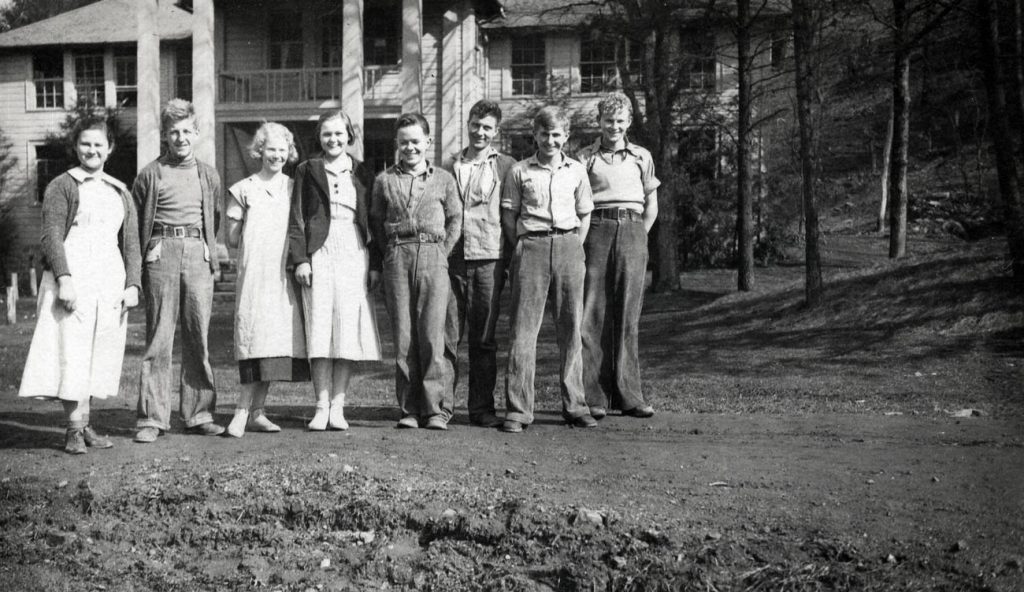
Students, From Left: ?, Enoch C. Hall, Jr., Lucille Christian, ?, ?. ?, ?, ?. c. mid-1930s in front of the Schoolhouse. [Students_1930s_frm.lft_Lucille_Christian_137.jpg]
When Lucille and Ruth arrived at Pine Mountain they found comfort in the friendship with other students whose hard-scrabble lives had also brought them to the school. Unlike so many public schools of the day, Pine Mountain School was a relatively level playing and learning field. Some of the friendships Lucille and her sisters made lasted a lifetime, particularly the bonds made in the PMSS Girl’s Octet.
![PMSS Octet members, 1937 - (l-r) Georgia Dodd, Lucille Christian, Nan Milan, (seated) Fern Hall, Joan Ayers, Ruth Christian, Lela Christian, Ruby Ayers [pmss_octet0002a_mod]](https://pinemountainsettlement.net/wp-content/uploads/2013/12/pmss_octet0002a_mod-242x300.jpg)
PMSS Octet members, 1937 – (l-r) Georgia Dodd, Lucille Christian, Nan Milan, (seated) Fern Hall, Joan Ayers, Ruth Christian, Lela Christian, Ruby Ayers [pmss_octet0002a_mod]
During the time that Lucille was a student (1935-1939) and a postgraduate (1939-1940) at Pine Mountain Settlement School, she showed a remarkable capacity to learn quickly. Her intelligence was, however, not always matched by her efforts as a scholar. In speaking of her experience at the School in later years she always came back to the lessons learned and at the top of her list was discipline and friendships.
Lucille was unusually gregarious. She excelled at extra-curricular activities and two of those were singing and dancing. Glyn Morris wrote of her extracurricular enthusiasm
She was unusually active in extra-curricular functions, especially those which were musical. With the exception of a strong attachment for one of the boys, her personality development was normal. She was a little spoiled by the teachers but gave no serious disciplinary trouble. It was necessary to reprimand her on several occasions for a somewhat supercilious disregard for workers’ authority.”
Dancing on the margins of obedience seemed to be the trait of all the girls in the Octet and Lucille was no exception. The School’s Octet, the all-girls choral group that was formed under the management of PMSS Director, Glyn Morris, was life-shaping. By 1936, Lela had joined her two sisters at Pine Mountain and the three sisters, all with talents in music, were tapped by Glyn Morris to become part of a new ensemble, the Pine Mountain Settlement School Girl’s Octet.
Lela, Ruth and Lucille joined three other sisters from the Ayers family. Ruby, Georgia and Joan Ayers were also accomplished singers and musicians and independent spirits. Fern Hall, a first cousin of Jean Ritchie, the youngest of the “Singing Family of the Cumberlands,” and Nan Milan another bright and talented student. rounded out the group.
In 2007 Lucille’s son, George McKinney III, shared with the Pine Mountain School Archive reports and ephemera of the 1936 and 1937 Octet tours. The images and transcriptions of these reports, titled “Roosevelt White House Entertainment” and “The Octet,” may be seen in full at MUSIC PMSS Girls Octet 1936-1938.
George McKinney describes the activity of the Octet in 1936-1937:
“A major factor in the Pine Mountain Settlement School efforts to gain publicity and funding were two tours by the Pine Mountain Octet. The first was in November 1936, and involved twenty-two engagements including Kansas City, Indianapolis, St. Louis, Chicago, and Pittsburgh, as well as a performance at Mr. and Mrs. Henry Ford’s regular Friday night country dance party held in the research building of the Ford Motor Company. The Indianapolis Times stated, “There is something uncanny in listening to eight flaxen-haired mountain girls from Kentucky singing music, though it belongs to their lives today, which traces its origin back into the mists of antiquity… None of the troupe is older than twenty. Yet they have the poise of persons much older.”
The second tour was in May 1937 and included Washington, Rye, Scarsdale, New York City, and Montclair, New Jersey. This included a radio broadcast over station WJZ (NBC). The Octet was the first group to publicly sing the Christmas carol “I Wonder as I Wander”, which was introduced to them by the Director of the Pine Mountain Settlement School, Glyn A. Morris, who had first heard it from John Jacob Niles, who is generally credited with writing it.
The Octet program consisted of two parts. The first of singing; the second of English Country dances. Two boys joined the ensemble and Mr. Morris and Arthur Dodd, the accompanist, served as partners for the dancing.
Prepared by George McKinney
[Son of Lucille Christian McKinney, one of the Octet members]
Gallery: WHITE HOUSE PROGRAM
- PMSS Octet program, 1937, page 01. [PMSS_ser31_oct0002b]
- PMSS Octet program, 1937, page 02. [PMSS_ser31_oct0002c.jpg]
- PMSS Octet program, 1937, page 03. [PMSS_ser31_oct0002d.jpg]
- PMSS Octet program, 1937, page 04. [PMSS_ser31_oct0002d.jpg]
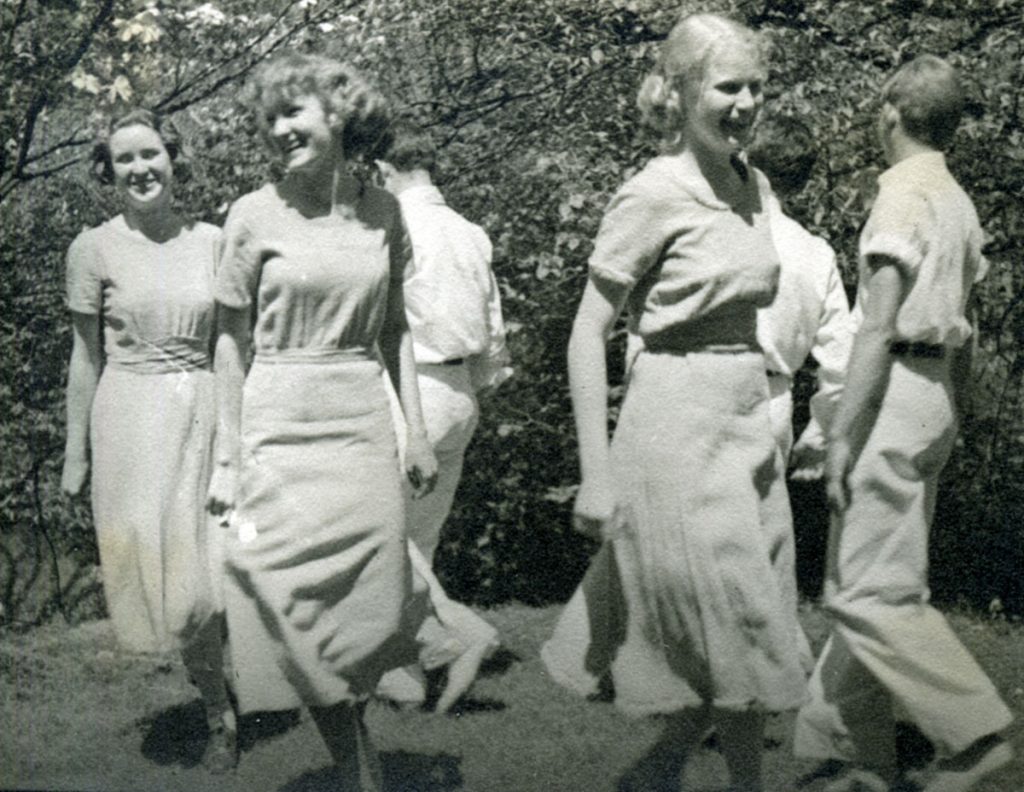
[folk_dancing_1930s_.jpg]
LUCILLE CHRISTIAN: Community Service at PMSS
When Lucille graduated PMSS in May 1939, she was invited back to Pine Mountain for a special post-graduate program (1939-1940) that included service in the local community. It was a formative year for her and the other girls who joined her in the “extra year” of service. Her sister Lela, also completed this extra year of service. Called Community Service, the year was devoted to direct services to homes in the immediate Pine Mountain valley and surrounding hollows. The services included pack-horse library work, nursing assistance, literacy training and assistance in the many one-room schools in the area. This program proved to be a significant component in later commitments to service throughout the life of most of the students who were engaged in the program.
LUCILLE CHRISTIAN Student: Berea College
Following her departure from Pine Mountain and with this rich experience bolstering her confidence, Lucille began college in Berea in 1940, a school recommended by Glyn Morris. Berea College has a long association with the settlement schools in Eastern Kentucky and a commitment to offering a no-tuition education to capable students.
At the college, Lucille found many commonalities with her fellow students and a supportive and highly skilled faculty. There, she also gravitated toward extra-curricular activities and in her senior year, she was selected as the lead, “Amanda,” in the popular Appalachian-based play, Sun-Up, by the North Carolina author, Lula Vollmer. Since 1929 when the play was offered to a New York audience as a fund-raising event for Pine Mountain Settlement School by the actress Lucille LaVerne, it was associated with Appalachian folk culture. At the 1929 event, Evelyn K. Wells, secretary at Pine Mountain, had offered ballads and a demonstration of the Kentucky Running Set probably by the Folk Dance Society of Boston or New York. The play’s theme, about attempts to stop violent feuding in the North Carolina mountains, was all too familiar to many students at Berea. The theme must have carried special significance for Lucille.
LUCILLE CHRISTIAN: Marriage to George Wesley McKinney Jr.
It was at Berea that Lucille met her future husband, George Wesley McKinney Jr. The story is told that George, born in Amigo, West Virginia, had his eye on Lucille even before he enrolled in Berea. Lucille had traveled to West Virginia to perform with a Pine Mountain group of dancers and balladeers and George, as he tells it, was charmed. Lucille had been chosen to execute a complicated folk dance for the visiting group, called “Baca Pipes” in which the dancer negotiates two long pipes placed on the ground in the form of a cross. Using a nimble series of jig steps the dancer tries to not disturb the pipes by her dance steps. The illustration below may, in fact, be Lucille performing at May Day at Pine Mountain in the late 1930s.
- Baca Pipes dance on the Dancing Green, late 1930s.[burkh_005.jpg]
- Baca Pipes dance on the Dancing Green, late 1930s.[burkh_006.jpg]
- “Baca Pipes” dance on the Dancing Green at PMSS, 1930s. [Baca_Pipes_138.jpg]
- Ayers girls and Lucille Christian with Abbie Winch Christensen to far right back row. [burk_dance_015.jpg]
Whether memory of this performance and the charming girl brought George to Berea is not certain, but he wasted no time in courting her and winning her affection after arriving. They were married on September 5, 1941, in a ceremony presided over by Glyn Morris. Ruth, Lucille’s sister, had planned a double wedding but was married later, also by Glyn Morris.
Following marriage, Lucille and George lived in Berea and completed their college degrees. Lucille majored in English [?] and her husband George completed his undergraduate degree in Economics. Their early educational experience began a life-long association with Berea College* and the eventual creation of the George and Lucille C. McKinney Service Award which is funded by an endowment from donations from George and Lucille and/or their family. The award is given to a junior who is an active participant in volunteer service in the college community. Nominations are sought from a recognized campus organization including residence halls and labor departments.
[*Berea College – A no-tuition institution where 96% of first-year students are eligible for federal Pell Grants which are given to low-income students. The $34,000 per student cost is further subsidized through the institution’s endowment. The median family income for students — many of whom come to the school from poor parts of Appalachia — is under $30,000.]
George McKinney Jr. was an accomplished student, a distinguished military officer and built an internationally recognized career as an economist. He was born on May 27, 1922, in Amigo, West Virginia. After graduating from Berea, George completed service in World War II as a Captain in the United States Army where he helped in the rebuilding of Berlin. At the end of the war, he earned his M.A. (1947) and his Ph.D. (1949) in Economics at the University of Virginia. He began his career at the Federal Reserve Bank of Richmond where he wrote the Federal Reserve Discount Window still in use today and was much in play during the recent 2008 banking crisis. He went on to a long and prestigious career as President of the National Association of Business Economists and was faculty at the Stonier School of Banking and at the McIntire School of Commerce at the University of Virginia as the Virginia Bankers Association Professor of Bank Management. He was much in demand as a consultant even after retirement.
LUCILLE CHRISTIAN Student: The Influence of Glyn Morris
Neither George nor Lucille ever forgot their roots in the Southern Appalachians and the difficult circumstances that brought her to Pine Mountain and George to Berea. The timing for the three Christian sisters could not have been better as the new Director, Glyn Morris, a progressive theologian who had studied with Reinhold Niebuhr at Union Theological Seminary, was enthusiastic in his attention to the individual needs of students who showed promise. Lucille was clearly one of his favorites.
Morris believed that education should have a strong guidance point of view. He said in his Survey of Education – Study & Recommendations IV Records, created for the Board of Trustees that
“…a strong guidance point of view can operate best when based on a well laid out and adequate system of records. If our conception of Guidance is breaking down education in terms of individual needs as the child develops, and helping him to well-thought-out vocational plans and preparation for them, much must be learned, recorded and used, about the individual.”
Through Morris, it is possible to track the lives of many of Pine Mountain’s successes and their failures. Morris often promoted Lucille’s achievements as a model of his educational programming, saying of her that she showed “above average … brightness and initiative…” In an anecdotal overview of a select group of students, he describes the first encounter with Lucille through to her successful graduation from Berea and marriage to George McKinney. Typical of Morris’ social engineering instincts and the close attention given to students by the School and its instructors during the Morris years, the records sometimes hit the mark and sometimes not. He writes:
She wished to get into some branch of journalistic work. The following anecdotes by two different teachers throw some light on her possibilities at the time. “A tireless and enthusiastic worker who wastes no time and makes no excuses. She plans her work and demands little attention. She is open to and asks for criticism; usually has a good reason for anything that she produces. Revision and alterations are somewhat disagreeable to her and she always does them somewhat reluctantly but does them nevertheless.
LUCILLE CHRISTIAN: Her Best Friend, Juanita Kreps
Lucille valued her deep friendships and one person, not from Pine Mountain, but with a similar history in Eastern Kentucky, became a fast friend over the years. Juanita Kreps, grew up in the coal-mining town of Lynch, Kentucky, just next-door to Cumberland where Lucille had begun her life. Juanita was also was born in 1921 and was from a broken home. Her mother had divorced her father, a coal-mine operator when Juanita was four. Both were schooled in boarding school environments. Lucille was 13 when she arrived at Pine Mountain and Juanita was 12 when she was sent to nearby Stuart Robinson School at Blackey, in Letcher County, Kentucky. Stuart Robinson was a mission school administered by the Presbyterian church and like Pine Mountain, it was founded in 1913, By 1942, the two friends found themselves enrolled in Berea College. At Berea, Lucille, George, and Juanita formed a deep bond that lasted a lifetime.
Lucille’s friend Juanita excelled at Berea College where she graduated with honors in Economics in 1942, and went on to become the first woman Secretary of Commerce appointed by Jimmy Carter on January 23, 1977, and served until October 31, 1979. There had been many “firsts” before Juanita’s cabinet posting. They included her Presidency of Eastman Kodak and J. C. Penny and the first woman to head the New York Stock Exchange, the first woman Vice-Provost of Duke and then the Carter Cabinet appointment.
When Juanita died in 2010, Lucille lamented the loss of her friend when she sent a note to one of her Octet group noting the death. She often spoke of her friendship with Juanita and told with glee the story of Carter’s remark that he had had a hard time finding qualified women to place on his Cabinet to which Kreps replied, “We just have to do a better job of looking.” Carter apparently smiled and said, “I think she just said that she disagrees with me.” Lucille had the same soft strength as Juanita — a bond that the two learned in the rough, complex and sometimes brutal life of mining towns. Eastern Kentucky was an environment that cried out for reform and services for the human spirit. Like Morris, Lucille and Juanita were strongly influenced by Reinhold Niebuhr. One of Kreps’ proposals while in the Carter Cabinet was the development of an “audit of social responsibility to measure companies’ contributions to the common good.” [Kreps Obituary]
LUCILLE CHRISTIAN: Community Work
While Lucille’s husband was building a career in banking at the Federal Reserve Bank of Richmond, Lucille was raising their children and positively impacting their community through her work as President of the Westhampton School PTA during the critical years leading up to the U.S. Supreme Court’s decision in Brown v. Board of Education.
Lucille never failed in her responsibility to contribute to each community in which she lived. She was skilled in her efforts at gently persuading those around her to “do the right thing.” Pine Mountain’s student self-governance programs were excellent training as was the guidance of Morris and the new civics instructor and student counselor, Everett K. Wilson, a recent graduate of Antioch College. Wilson’s small book A Lesson in Civics, issued to each student, provided a clear map for social interaction at the school, the community, the state, the nation, and the world. The Foreward to the small book notes:
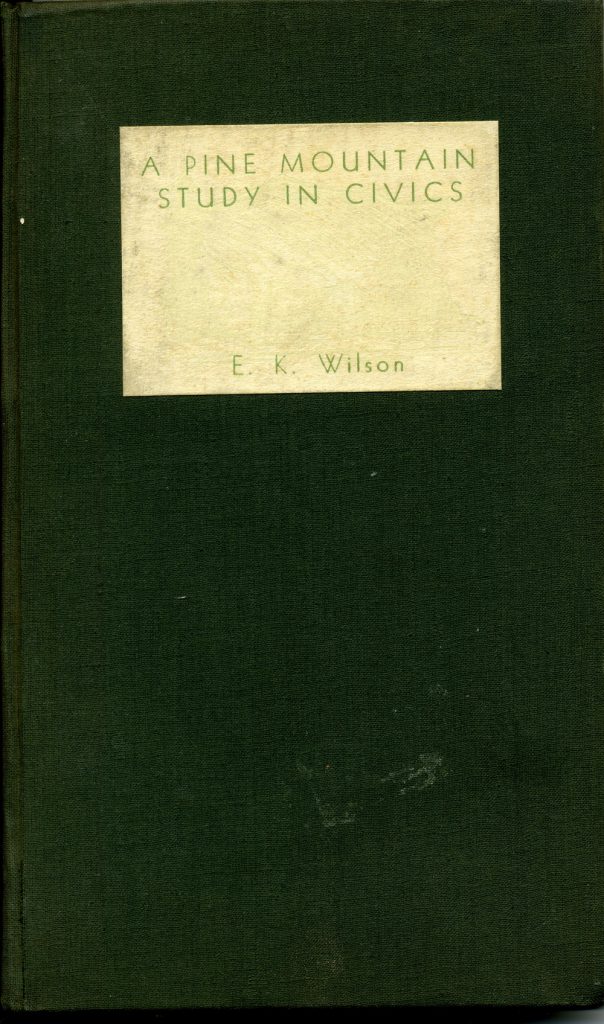
Everett Wilson. Study in Civics. [wilson_study_cover.jpg]
Good citizenship begins at home. Too often we are willing to wave our flag and sing with fervor the national anthem while at home in our own communities we become entirely forgetful of our duties as citizens.
It is well to be reminded of these duties and problems occasionally. We accept without thought the privileges of citizenship in a community — the benefits of specialized labor, of friendly neighbors, of fire and police protection, of water, electricity and good roads. These benefits are the contributions of good citizens, both past and present, to our communities. We owe them our gratitude. But we also have an obligation to the future.
Everette K. Wilson became one of the pioneers in the field of sociology and had a long career on the faculty of the University of North Carolina at Chapel Hill.
Building on her innate empathy and sense of civic responsibility and the Pine Mountain training, Lucille set about applying her mediation skills in her public service activity in the cities where she and George lived. Richmond, Virginia, where the family lived while George completed his doctorate and where he began his career at the Federal Reserve Bank of Richmond, was particularly memorable. Lucille’s son George McKinney III describes those years:
The Brown vs Board of Education ruling was in 1954. In Virginia, Senator Harry Byrd declared that the state needed to have “massive resistance” to the ruling. The legislature passed a number of bills to make integrated schooling virtually impossible, including one that both allowed cities and counties in the state to provide funding to private schools while doing away with any requirement that they maintain public schools. What was left for colored children who were in segregated school systems was the court system, so one by one they sued to get the public schools integrated. As the courts required each polity to integrate, that polity would close the public school system. This happened in Norfolk, Charlottesville, and Warren County.
Then came Richmond in 1959. There was a small (2 square blocks) area of colored families that literally was right next to the all-white Westhampton School (both a grade school and a middle school). The parents of one girl sued to get her the right to attend Westhampton Middle School. She won the lawsuit. The school board, led by a strong Superintendent of Schools, Henry Willett, passed a budget for the next year. There was then a movement in Richmond to invoke “massive resistance” by rejecting the school budget and closing the schools.
My sisters Ruth and Mary were in the Westhampton Middle School. Our mother volunteered to become the President of the Westhampton PTA (she had actually been the Vice President) and maneuvered (that’s the only word I can use) the PTA to support the school budget (including creating a rule that no one was allowed to attend the PTA meetings unless they had children in the school, thus silencing the most vocal “massive resistance” supporters). Willett credited Mom and the PTA support with helping him break the back of the “massive resistance” movement in Richmond and the schools integrated peacefully. Mom always said that while she supported integration, her real motivation was keeping Ruth and Mary in public schools!
Lucille’s motivation might have been pragmatic, but her efforts were remarkable given the brittle acrimony and many school closures of the time. Thanks to Lucille’s clever guidance, the school stayed open and other schools followed her lead through the sea of dissent. This soft persuasion was evident in Lucille’s service work in many of the communities in which the McKinney’s lived, including Montclair, NJ, when Dr. McKinney’s career led him to a position as Senior Economist of Irving Trust Company in New York City. Strangely coincidental, Montclair, NJ, was the same town that Lucille had visited in 1936 at the age of sixteen as a member of the Pine Mountain Settlement School Girl’s Octet.
**********
After retirement, Dr. McKinney and his wife moved to Fearrington Village and then to Carolina Meadows Retirement Community in Chapel Hill, North Carolina, where George died at age 92 on January 13, 2015. Lucille and George celebrated their 73rd wedding anniversary four months before George died on January 13, 2015.
The Christian sisters’ parents were Neal Christian (1886-1922) and Lida (Martin) Christian. Besides Lucille, Ruth, and Lela, there were two other children: Ruby and Bobby.
George and Lucille had three children: George W. McKinney III, Mary McKinney (Schweitzer), and Ruth Ann McKinney.
Lucille Christian was born on November 7, 1921. She died on August 14, 2017, at the age of 96.
**********
*In preparing this biography, Pine Mountain Settlement School is especially grateful for the edits and supplemental material provided by the children of Lucille and George McKinney.
See Also:
Obituary:“Lucille C. McKinney (1921-2017)”
Published by The Chapel Hill (NC) News & The News and Observer
MUSIC PMSS Girls Octet 1936-1938
LELA CHRISTIAN Student
RUTH CHRISTIAN Student
ROBERT PHILLIPS Student
GEORGIA AYERS (DODD) Student Staff
JOANNA AYERS Student Staff
RUBY AYERS Student
|
Title |
Lucille Christian |
|
Alt. Title |
Lucille (Christian) McKinney; Mrs. George McKinney ; Lucille McKinney ; |
|
Identifier |
|
|
Creator |
Pine Mountain Settlement School, Pine Mountain, KY |
|
Alt. Creator |
Ann Angel Eberhardt ; Helen Hayes Wykle ; |
|
Subject Keyword |
Lucille Christian ; Lucille (Christian) McKinney ; George Wesley McKinney. jr. ; Pine Mountain Settlement School ; students ; PMSS Octet ; Glyn Morris ; Ruth Christian (Russell) ; Lela Christian (Meador).; Neal Christian ; Lydia (Martin) Christian ; Ruby Christian ; Bobby Christian ; George and Lucille C. McKinney Service Award ; Pine Mountain, KY ; Harlan County, KY ; Berea College ; Berea, KY ; Chapel Hill, NC ; |
|
Subject LCSH |
Christian, Lucille, — died August 2017. |
|
Date |
2014-02-11 |
|
Publisher |
Pine Mountain Settlement School, Pine Mountain, KY |
|
Contributor |
n/a |
|
Type |
Collections ; text ; image ; |
|
Format |
Original and copies of documents and correspondence in file folders in filing cabinet |
|
Source |
Series 19: STUDENTS |
|
Language |
English |
|
Relation |
Is related to: Pine Mountain Settlement School Collections, Series Series 19: Students |
|
Coverage Temporal |
1935-1940 |
|
Coverage Spatial |
Pine Mountain, KY ; Harlan County, KY ; Berea, KY ; Chapel Hill, NC ; |
|
Rights |
Any display, publication, or public use must credit the Pine Mountain Settlement School. Copyright retained by the creators of certain items in the collection, or their descendants, as stipulated by United States copyright law. |
|
Donor |
n/a |
|
Description |
Core documents, correspondence, writings, and administrative papers of Lucille Christian (McKinney) ; clippings, photographs, books by or about Lucille Christian (McKinney) ; |
|
Acquisition |
n/d |
|
Citation |
“[Identification of Item],” [Collection Name] [Series Number, if applicable]. Pine Mountain Settlement School Institutional Papers. Pine Mountain Settlement School, Pine Mountain, KY. |
|
Processed By |
Helen Hayes Wykle ; Ann Angel Eberhardt ; |
|
Last Updated |
2014-11-02 hhw ; 2015-08-27 aae ; 2017-07-20 aae ; 2017-07-31 aae ; 2017-12-08 hhw ; 2017-12-19 hhw ; 2022-06-18 hhw ; 2025-05-30 aae ; |
|
Bibliography |
Sources Boarding School Students 1929-1949 and Glyn Morris Study & Recommendations 1942 [For PMSS]. Series 19: Students, Pine Mountain Settlement School Institutional Papers. Pine Mountain Settlement School, Pine Mountain, KY. Internet resource. “George Wesley McKinney, Jr.” The News & Observer (Raleigh, NC), Obituary, January 18, 2015. http://www.newsobserver.com/latest-news/article10225868.html (Accessed 2017-July-20.) Internet resource. “United States Census, 1940,” database with images, FamilySearch (https://familysearch.org/ark:/61903/1:1:K7TW-WVS : accessed 27 August 2015), Lela Christian in household of Lydia Christian, Cumberland City, Magisterial District 3, Harlan, Kentucky, United States; citing enumeration district (ED) 48-24, sheet 8A, family 147, NARA digital publication T627 (Washington, D.C.: National Archives and Records Administration, 2012), roll 1314. Bibliography Virginia’s “Massive Resistance” to School Desegregation in the University of Virginia’s Digital Resources for American History, accessed 12/19/2017 Ely, James. The Crisis of Conservative Virginia: the Byrd Organization and the Politics of Massive Resistance. Knoxville, TN: University of Tennessee Press, 1976. Muse, Benjamin. Virginia’s Massive Resistance. Bloomington: Indiana University Press, 1961. Wilkinson, J. Harvie III. Harry Byrd and the Changing Face of Virginia Politics, 1945-1966. Charlottesville, VA: University Press of Virginia, 1968. Guide to the Appalachian Ballad and Folk Music Collection. Berea College, Special Collections Spalding, Susan. Appalachian Dance: Creativity and Continuity in Six Communities. University of Illinois Press, 2014. Recently published: Salzburg, Nathan, “Wonderous Love” (Track 22) and “Pretty Polly,” (Track 23) in KENTUCKY MUSIC ISSUE CD TRACK LIST, Oxford American, ISSUE 99, WINTER 2017. |
Return To:
BIOGRAPHY – A-Z
PMSS STUDENT LISTS Guide

